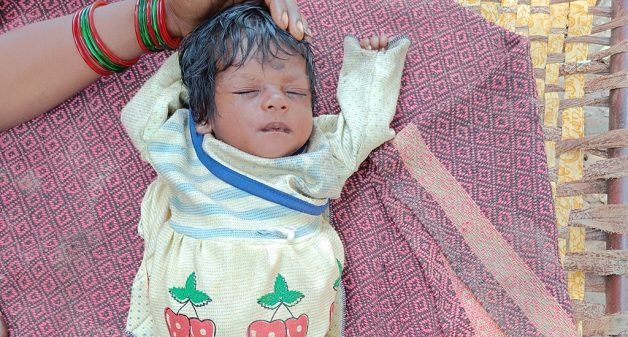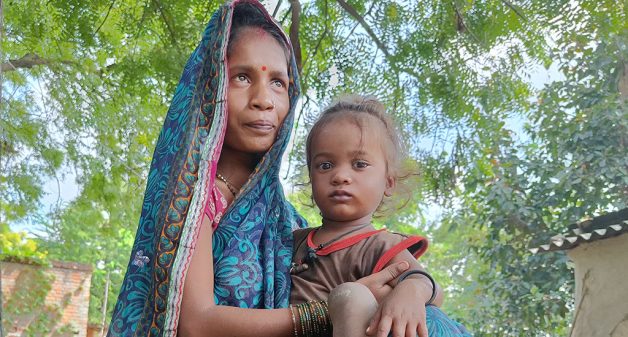
Weak and vulnerable pandemic babies
The pandemic cut off health care, and sometimes even food, from many marginalised Indians, with pregnant woman often taking the brunt of the burden. Now their children are paying the price.

The pandemic cut off health care, and sometimes even food, from many marginalised Indians, with pregnant woman often taking the brunt of the burden. Now their children are paying the price.
When the COVID-19 pandemic first hit, life became tougher than usual for Khusboo. A, who lives in a Musahar (Dalit) settlement outside Varanasi in Uttar Pradesh. Her husband, who used to work in a fabric factory in Gujarat, lost his job and they could not afford three meals a day.
“I would cook during the day and we used to eat the leftovers for dinner,” Khusboo said.
Then she became pregnant with her second child.
“When I got pregnant in October last year, I was told to eat well and rest, but how could we afford that?”
Khusboo is anaemic. But like many mothers and wives, she made sure her child and husband were as well fed as possible before she ate her meal. This did not give her the healthiest pregnancy.
Birth defect babies
“When my baby was born I was told that it was a girl. But now, two months later, I realise I’ve given birth to a transgender baby. I’ve named her Anjali though. She is extremely weak, just like my older child,” said Khusboo.
Anjali weighed 1.50 kilograms when she was born, which officially classifies her as a low birth weight baby. It is not surprising she is also anaemic.
Anaemia is a serious global public health problem that particularly affects young children and pregnant women. The World Health Organisation estimates 42% of children less than five years of age and 40% of pregnant women worldwide are anaemic.
In Khusboo’s state of Uttar Pradesh, with many impoverished districts, 53% of its women are anaemic.

At the start of the pandemic the United Nations warned that children might not be “the face of this pandemic, but they risk being among its biggest victims.”
“Women and girls have unique health needs, but they are less likely to have access to quality health services, essential medicines and vaccines, maternal and reproductive health care… especially in rural and marginalised communities,” according to the UN report The Impact of COVID-19 on Women.
Cut-off from health services
But Khusboo’s poor pregnancy diet was not the only contributing factor to her baby’s health problems.
Firstly, getting to medical facilities was tricky for most people during the lockdowns, but near impossible for those living in remote areas.
Fear of catching the coronavirus was also intense. Like many throughout the country, Khusboo and her family were scared when they went to the local primary health centre (PHC). But the prevailing panic meant everyone’s paranoia was high – even health care workers, who did not always treat people from her community with care and dignity at the best of times.
“I had been to the PHC during my pregnancy, but they treated me as if I were some animal. That’s why I chose to deliver at home,” she told Village Square.
Khushboo is not the only woman in her community fighting anaemia with limited resources.
Shintu Devi is also anaemic and gave birth to a premature baby, her second child, in January only to lose the baby in May at the height of the pandemic.
She lives with her husband, parents-in-law and son. Her husband is the only earning member of the house but his income is not steady.
“He works as a labourer in the city. But from June to September, he got no work because of the rains. There wasn’t any earning during the lockdowns as well, so we had it hard all this while,” said Shintu Devi, who does not hold a ration card, though others in her family do.
“Right from her pregnancy and throughout it, Shintu Devi was anaemic and malnourished,” said Ruby Devi, field coordinator for People’s Vigilance Committee for Human Rights, a non-profit organisation working to provide basic rights. “She barely eats green vegetables or dal. Fruits and milk are beyond imagination.”
But, again, poor medical care and pandemic paranoia added to her baby’s problems.
Despite delivering her baby at seven months gestation, she and the premature baby were discharged from hospital the very next day.
“They said I better stay at home to steer clear of COVID-19,” she said.
Now, the still-frail Shintu Devi holds her first child close and rarely lets him out of her site.
“I will play with him for some time and then make him sleep. I have to wash dishes after that. But I don’t leave my boy for a minute, not after I lost my baby girl,” Shintu Devi said.
(Some names in the story have been changed upon request.)
Jigyasa Mishra reports about rural issues from north India. She primarily writes on women’s issues and public health.